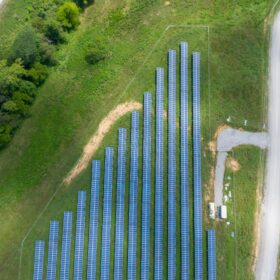California gas plant to be re-powered with batteries + solar
For the second time in a month a fossil fuel-fired power plant in California is set to be replaced by a battery powered by a solar, including distributed solar. A small portion of the former plant will be retained.
The billion-dollar battery boom
Corporations are buying up batteries and investing in their companies like it’s going out of style.
The bones of Skeleton Creek are coming together
NextEra has announced a power purchase agreement with Western Farmers Electric Cooperative for a combined 250 MW wind farm, 250 MWac solar farm, and 200 MW / 800 MWh of energy storage in Oklahoma.
Solar + batteries help the grid recover in Kaua’i
After experiencing cascading outages across its conventional fleet and cloudy weather impairing its solar output, the island is back on-line and solar and batteries are helping to meet demand while its largest power plant is being repaired.
The people vs. HB 6, Con Edison reaches 250 MW installed: pvMB 7/25/19
Two things are absolutley certain right now. It’s Thursday and you’re reading the pvMB. Today we’ll be looking at Independent developers dominating the NC solar auction, Sunnova announcing share prices, the very cool LightSail 2 spacecraft and more!
Target defends its crown as largest adopter of on-site corporate solar power
The top on-site home for corporate solar remains the same in SEIA’s 2018 Solar Means Business Report, but new challengers have entered, as the report includes off-site solar for the first time.
A way oversized DC:AC ratio seen in the wild!
Swinerton Renewables & SolarFlex have announced a 26.4 MWac solar project, which public documents show is bigger than 48.6 MWdc – meaning a greater than 1.8:1 DC to AC ratio.
ConEd shuts Brooklyn off, seeks 1.21+ gigawatt-hours of batteries
While the New York utility struggles with heatwave conditions, the group issues a request for proposals for 310 MW of energy storage power with at least four hours of capacity, with projects due to complete by the end of 2022.
One atom layer to ‘free the electrons’
Scientists from the University of Kansas say adding a layer of two-dimensional semiconductor molybdenum disulfide can greatly improve the performance of organic solar cells. The research could also inform efforts to engineer the interface between layers in hybrid organic cells.
Tri-State dumps coal, eyes wind and solar as new fling
Tri-State Generation and Transmission Association has announced it is creating an aggressive “Responsible Energy Plan,” one which begins with the retiring of the 100 MW Nucla Coal Plant in early 2020.















